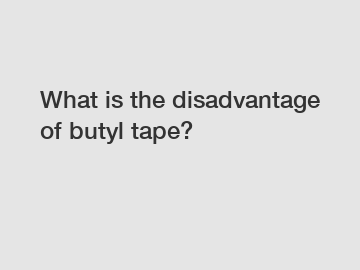What is the disadvantage of butyl tape?
What is the disadvantage of butyl tape?
Butyl tape is a versatile and widely used adhesive tape that offers numerous benefits. It is commonly used in construction and automotive industries due to its excellent sealing properties. However, like any other product, butyl tape also comes with certain disadvantages. In this article, we will explore the drawbacks of butyl tape and highlight the factors that may make it less suitable for specific applications.
1. Limited heat resistance:

One of the primary disadvantages of butyl tape is its limited tolerance to high temperatures. Butyl tape typically has a maximum operating temperature of around 180°F (80°C). When exposed to temperatures beyond this limit, the tape may lose its adhesive properties, become less effective in sealing, or even melt. This limitation makes butyl tape unsuitable for applications that involve continuous exposure to extreme heat, such as automotive engine compartments or industrial heating systems.
2. Slow curing time:
Another drawback of butyl tape is its slow curing time. Unlike some other adhesive tapes that quickly bond upon application, butyl tape can take hours or even days to fully cure and reach its maximum bonding strength. This slow curing process can be inconvenient in situations where a rapid bonding solution is required. However, it is important to note that this characteristic can also be advantageous in certain contexts, allowing for easy repositioning or adjustment during installation.
3. Potential staining:
Butyl tape is manufactured with a sticky, rubber-like consistency, making it susceptible to attracting dust, dirt, and other particles. Over time, these particles can accumulate on the tape's surface and cause it to become discolored or stained, particularly in dusty or heavily polluted environments. While these stains do not affect the tape's sealing performance, they may impact the overall appearance, which can be a concern for applications where aesthetics are important.
4. Limited UV resistance:
Exposure to ultraviolet (UV) radiation from sunlight can degrade the properties of butyl tape. Prolonged exposure to UV rays can cause the tape to harden, crack, or lose its adhesion capability. Therefore, butyl tape may not be suitable for outdoor applications without additional UV protective coatings or coverings. Additionally, if used outdoors, careful consideration should be given to the expected lifespan of the tape and whether it requires periodic maintenance or replacement.
In conclusion, while butyl tape offers numerous advantages, it also has some noticeable disadvantages. Its limited heat resistance, slow curing time, potential for staining, and limited UV resistance make it less suitable for certain applications. However, when used within its specified temperature range and protected from the harmful effects of UV radiation, butyl tape remains an effective and reliable adhesive for various sealing requirements.
The company is the world’s best Pipeline Cold Wrapping Tape, Polypropylene Geotextile Bitumen Cold Applied Tape, 1027 liquid adhesive primer supplier. We are your one-stop shop for all needs. Our staff are highly-specialized and will help you find the product you need.

Comments
0